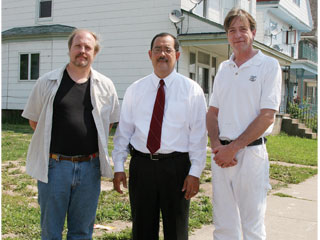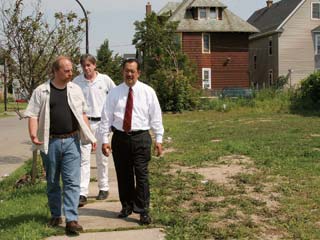Next story: On A Generous Note
Special Delivery
by Lucy Yau
La Nova said it needed parking, so the city paid to demolish a house, sold La Nova the empty lot at a discount, and brushed off opposition from neighbors and the district councilmember. Now that’s service!
Last month, in a rarely seen bit of political maneuvering, the Common Council voted 7-2 in favor of a transfer of property from the city to La Nova Pizzeria. In doing so, the Council voted against Niagara District Councilman David Rivera, and against the wishes of members of his community who had advocated for the parcel to be converted into a neighborhood garden and park space for local children.

Rivera and Joe Golombek of the North District were the holdouts against what many perceive to be an inside deal.
“In 99 percent of the cases, the councilmembers would defer to the district councilman,” Rivera says. “But the Council decided not to listen to the Niagara constituents.”
Those constituents worked hard to make their wishes known to the entire Common Council. They filed formal letters; they sent emails; and they submitted a petition opposing La Nova’s proposal to turn the property into a parking lot and advocating its use as greenspace, signed by 250 neighbors. “The community was very organized,” Rivera says.
Besides feeling frustrated at being overruled by his fellow colleagues, with whom Rivera is normally on friendly terms, he is also aggravated by the city’s Real Estate Division, which handled the sale of the property.
According to nearby neighbors Scott Talvitie and Erika Hedberg, the property in question, 366 West Ferry, was salvageable and could have been rehabbed, had it gone through the normal channels that city-owned properties undergo—to be put out to bid at auction.
Instead, Rivera says, “The property was demolished at taxpayer expense and turned around and sold for $3,700. There was no bid process; community input was completely ignored. There were more than two interested parties and the property should have been put out to bid.”
When residential properties are demolished, the average cost to the city is $15,000-$20,000. Emergency demolitions can cost as much as $30,000.
According to Bob Franke, executive director of the Grant Ferry Association, which has worked hard at revitalization efforts in the area, “The city would only accept La Nova’s offer, which still strikes me as very questionable. The mayor’s office was adamant about La Nova getting this. The real estate department was a mechanism for mayoral policy. This was incredible arrogance on the part of the Common Council, who chose to ignore citizen input. This was clearly deal-making rather than working for the common good.”
Franke spoke with some of the other councilmembers prior to the vote. “I talked to [Delaware District Councilmember Mike] LoCurto at length. [Lovejoy District Councilmember Rich] Fontana and LoCurto were wavering. I’m profoundly disappointed in LoCurto, who has a degree in urban planning and should know better. Fontana probably wanted to support a local business. I’m surprised by [Council President Dave] Franczyk’s vote, especially since he’s been working on the Broadway Market.”
Talvitie and Hedberg are mystified as to why La Nova is so fixated on 366 West Ferry when La Nova owns ample space behind their building which sits unused. For years La Nova has been renting parking space from Gary Rotundo, who owns a nearby dry cleaning service. In addition, La Nova already owns two vacant lots on Hampshire which directly abut the pizzeria.

When La Nova met with community resistance, they made vague threats to leave their West Side location. Franke stresses that while the neighbors are grateful La Nova is a business presence and employs local residents, he feels La Nova could have handled the situation better. “The Todaros have done a lot for the community with their St. Joseph Day fundraising, and we’re glad for those efforts.”
Nearby Arnold Street neighbor Eric Bockstahler approached the city to purchase the parcel once the house was demolished. He made sure he was current on whatever taxes he owed and followed the procedures set forth by the Real Estate Division, headed by John Hannon. “When I spoke to Hannon I made sure I crossed my t’s and dotted my i’s. I’m a law-abiding guy. I had dealings with the real estate department and the Common Council. The Council crossed council lines, which speaks volumes about how this city works.”
Bockstahler says he was warned off by an individual involved in the process, who told him his offer to buy 366 West Ferry was unwanted interference in a done deal. “The real estate department was following the mayor’s orders. The mayor instructed the department to sell to La Nova,” says Bockstahler.
Reviewing campaign contributions, in March 2007 La Nova gave Mayor Brown’s Leadership Council $500. This year Brown for Buffalo received $500 on April 11 and another $100 on July 3, shortly before the transfer.
At the July 8 Common Council meeting, Rivera asked that approval of La Nova’s acquisition of the lot be referred back to committee rather than put to a vote. Rivera wanted more time to bring the parties together and negotiate a compromise. The Council generally respects the wishes of the district councilmember in a case like this, and an agreement is usually reached in caucus, before the formal legislative session. But Ellicott District Councilmember Brian Davis—a close ally of the mayor who just recently authored a resolution demanding a moratorium on new surface parking lots in his own district—insisted that roll be called. Each member called out yes or no to recommittal. Davis, Masten District Councilmember Demone Smith, and University District Councilmember Bonnie Russell—the mayor’s closest allies on the Council—all voted against recommitting the issue.
Davis complained that La Nova had waited too long for approval. Rivera, seemingly taken aback, said La Nova so far had not been willing to meet with residents opposed to the acquisition. He said he needed more time. Davis replied that the La Nova had in fact agreed to meet, suggesting that he had spoken with La Nova that very day—even though the whole matter is outside his district. The exchange had the effect of suggesting that Rivera was failing in his job, and seemed calculated to embarrass him.
In fact, the Todaros never did meet with their neighbors. Instead, former Niagara District Councilmember Nick Bonifacio acted as surrogate, meeting with neighbors and speaking on behalf of La Nova. At the July 22 Common Council session, the deal came out of committee and was approved.
After the vote in favor of the transfer took place, Bockstahler filed an Article 78 lawsuit against the city. An Article 78 lawsuit is filed against a public body or officer when an illegal or capricious action has taken place. In this case Bockstahler felt the city had violated its own charter by not putting 366 West Ferry out for a public bid in an attempt to obtain fair market value or the highest amount possible. Bockstahler had been ready to submit a bid for $4,700—$1,000 more than La Nova—when the city told him they had already accepted La Nova’s lower offer of $3,700.
“I called the real estate department and found out about the deal in the paper,” Rivera says. “Mr. Hannon never contacted me back. The city owns thousands of homes. You’d think they’d be interested in having people buy these properties.”
The Brown administration has become notorious for its lack of transparency. “There needs to be accountability,” Rivera says. “Why is it taking so much time for people to get these properties? It should be whoever is the highest bidder gets it. The Office of Strategic Planning needs to reform the process so that it will give people confidence in their government.”
Rivera’s frustration with his fellow councilmembers, the mayor’s office, and the Real Estate Division is palpable. “I tried to mitigate the concerns of the community,” he says. “I tried to reconcile the business and neighborhood needs. The process was flawed. I still feel that the deal stinks.”
|
POSTSCRIPT Joe Todaro Sr. offers an olive branch On Tuesday morning, a handful of neighbors gathered with Councilmember David Rivera to be photogrpahed for this article, when Joe Todaro Sr. came out of the restaurant and, for the first time, spoke with his neighbors about the acquisition of 366 West Ferry. “He told us he wasn’t the bad guy and that the [Buffalo] News had made them out to be the bad guys, that it was the mayor all along, that the mayor had offered him the lot for $1 and that he was put in a bad spot,” Rivera says. “He now says they won’t put in a lot, they’ll put in grass seed and a garden. The residents were so happy. “The city approved this controversial sale to the Todaro family,” Rivera continued. “We fought the Todaro family, the city, the Common Council, and now they’re speaking to us. We’re still going to make sure everything’s okay and that asphalt isn’t laid down, but they assured us they wouldn’t put in a parking lot.” —lucy yau |
However, he is hopeful for the area. “We’ve made Grant Street a priority for development. We’re trying to find people to do business with, we’re working hard with the city to find inducements to attract businesses. We’re definitely encouraging development.”
The prevailing wisdom is that La Nova could have purchased the property through legal channels at auction by placing the winning bid, then demolishing the building at their own expense rather than pressuring councilmembers, the mayor’s office, and the real estate department to do so at taxpayer expense.
Bockstahler has since dropped his lawsuit. “I filed the Article 78 expecting the city to comply with its own charter, which says the city has to dispose of city-owned properties by putting them out to bid, which they never did. I decided to drop it because I felt it would be throwing good money after bad.”
He still intends to fight the transfer when the offer goes before the Zoning and Planning Boards.
La Nova has made no secret of its acquisition of nearby parcels. They have acquired property in the neighborhood incrementally over a period of time and have so far avoided any form of environmental or financial review of their property purchases or usages by segmenting the purchases.
“I’m still hopeful the Todaro family and the community can find a way to come together on an agreement,” Rivera says. “They’ve been generous with the community. We hope that they will rethink the use of that land. We’re still counting on the Todaro family to continue to do good things, to donate the lot for a community garden. A garden beautifies the area. If it was my business, I’d want my business to look good.”
Bockstahler is not so optimistic. “I was very aggressive about this,” he says. “I went to the councilmen. La Nova could have bought it legally but they pursued it so underhandedly. Hannon is a yes-man, and if you’re not you go the way of [former Commissioner of Economic Development, Permit and Inspection Services] Rich Tobe.”
Despite the legal wrangling Bockstahler has gone through, he says, “I’m still willing to buy it, I’m still willing to work with the city and the garden folks and be a taxpayer on city rolls.”
“Until they lay the asphalt down, it’s not over,” Rivera says.
blog comments powered by Disqus
|
Issue Navigation> Issue Index > v7n32: Special Delivery (8/7/08) > Special Delivery This Week's Issue • Artvoice Daily • Artvoice TV • Events Calendar • Classifieds |









 Current Issue
Current Issue